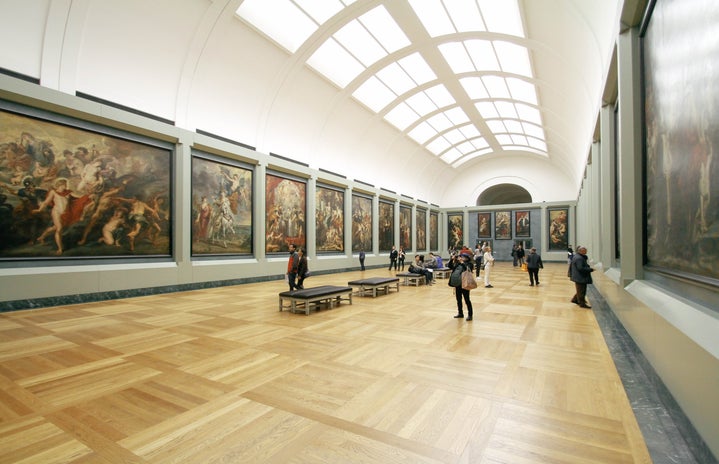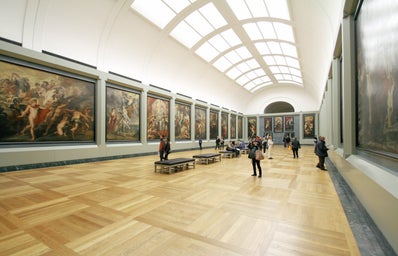On May 18th, Museum Day is celebrated worldwide. But have you ever stopped to wonder how important museums are for society? We interviewed Sofia Helena Cardoso, a historian, and Juliana Shiraishi, a sociologist, to understand more about it!
Museums carry the identity and memory of different social groups. “They are a space of preservation, conservation, and diffusion of the cultural, artistic, and historical patrimony of a society”, said Juliana Shiraishi, a sociologist of culture, who is currently getting her master’s degree at UNIFESP (Federal University of São Paulo) and does research specifically about museums.
One of the purposes of museums is to encourage the education and critical thinking of their visitors. People gain knowledge not only with the historical pieces inside them but also with the narratives and studies shared with the general public on the expositions. We need to remember the past to understand our present and current society. After all, the situation we live in the present is a result of multiple past actions. Discovering and learning more about our past in museums can make us perform our role as citizens more profoundly.
They also play a big part in economics. Museums are a highly requested aspect of tourism – some people visit specific towns only because of them, which boosts local commerce.
Museums are also important when it comes to students. Up front, they have more things beyond their exposition. Museums are composed of technical archives and collections that are not exposed, which contain crucial and primary sources. That comes in handy for students researching.
Even if you are a student who is not doing academic research, museums are still relevant. They provide information that surpasses the written history we learn, complementing the school and university education. In addition, museums have the power to share and legitimize cultures. “There are a lot of groups erased by the written knowledge, in a historical narrative that excludes them. The museum’s role is to bring this hidden history to light”, explained Sofia Cardoso.
Because of that, representativity inside museums is an aspect discussed nowadays. Historically excluded cultures and communities must appear too. They are just as important as others in our history.
“There’s a demand that social groups apart from the upper classes of society are also represented and recognized. That way, the identity, culture, and memory of the society, in general, can be legitimized, not only just a part of it”, complemented Juliana.
Museums shares cultures that are dead and alive. That’s why they are so necessary for our society. But how can museums accurately share this plurality of cultures?
Especially when it comes to live cultures, they can not expose it as a curiosity. It has to go deeper. Some cultures, such as de indigenous ones, fight to exist – a political matter that needs to be addressed by the museums. They need to give them a place of expression and protect them, not share it like a product. And that is something that museums have struggled with over time.
THE HISTORY OF MUSEUMS
Back in Europe, where museums were starting to be formed, nationalism played a definitive role. Antiquarians who kept collections of old pieces in “cabinets of curiosity” started partnering to create places that legitimized their countries’ national past. Then, with imperialism, they started exposing historical objects from the dominated places as something “exotic” and owned by the Europeans. This type of narrative is highly problematic. Yet, many of these historical artifacts have not returned to their native countries, and are still displayed as a curiosity and not as a legitimate culture.
Museums in Africa, America, and Asia started with the same nationalist principle as the European ones. In their case, they were trying to legitimize their own independence and national history. But, as museums became more educational and critical, the ex-colonized countries started breaking the old narratives. In a decolonization process, they are now trying to tell their own story in a more pluralistic and respectful way, especially when it comes to their native population.
MAKING MUSEUMS MORE DEMOCRATIC
Museums are a space of conservation, but they upgrade. Currently, there are different concepts of museums: ecomuseums, multicultural ones, decolonial ones, museums created by small communities, and so on.
This is happening due to the need to be more democratic since they have been linked to the upper classes for so long.
For starters, museums must be more accessible and close to the community. All social groups have to be encouraged to visit them. Despite that, the exhibitions themselves should be more democratic. It’s not only about canonical and traditional themes! Contemporary topics, such as racial and gender problems, should also be discussed inside the museums, which can happen in different ways: presentations, fairs, cinema days, and interactive expositions.
With that, museums can help even more to strengthen the sense of community among members of society. They can make them realize the importance of their culture and feel represented. The visitor can also be a part of the story told in museums.
CHALLENGES MUSEUMS FACE ON CONTEMPORANEITY
Museums are a political device to promote knowledge, leisure, and citizenship. But their importance is often neglected by some nations.
As an example, consider Brazil. In 2018, the country’s National Museum, associated with the Federal University of Rio de Janeiro (UFRJ), was almost destroyed by flames. The historical pieces and research archives burned in the 200 years old museum (at the time), representing an immeasurable loss for society as a whole.
The tragedy shows how the country has been progressively putting culture aside. For years, the Ministry of Culture, which also looks after museums, had received little attention from the government. Culture was not a priority and, in 2019, the ministry was closed, making the cultural situation even worse.
That has been the reality of museums in Brazil for the past few years. Gladly, the Ministry of Culture was re-established this year, and there’s still hope for museums – that they will finally get the attention they deserve. After all, they are crucial for society: preserving and sharing cultures, educating people, improving the economy, and representing social minorities.
The article above was edited by Isadora Costa.
Liked this type of content? Check Her Campus Cásper Líbero home page for more!


